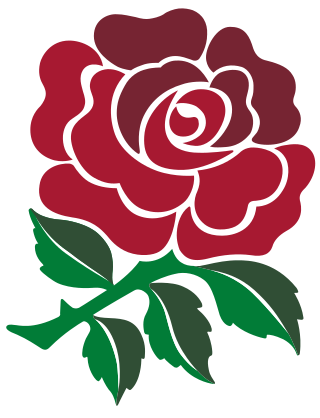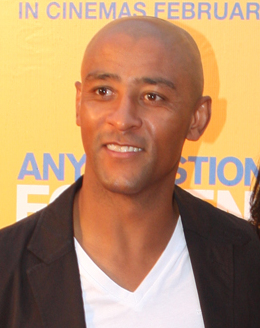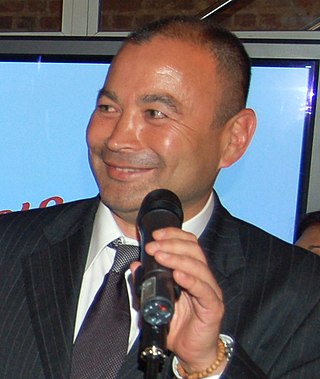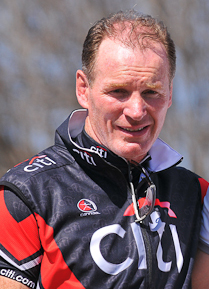
The Australia men's national rugby union team, nicknamed the Wallabies, is the representative men's national team in the sport of rugby union for the nation of Australia. The team first played at Sydney in 1899, winning their first test match against the touring British Isles team.

The England men's national rugby union team represents the Rugby Football Union in men's international rugby union. They compete in the annual Six Nations Championship with France, Ireland, Italy, Scotland and Wales. England have won the championship on 29 occasions, winning the Grand Slam 14 times and the Triple Crown 26 times, making them the most successful outright winners in the tournament's history. They are currently the only team from the Northern Hemisphere to win the Rugby World Cup, having won the tournament in 2003, and have been runners-up on three further occasions.

George Musarurwa Gregan AM is a retired Australian rugby union player, and is currently Australia's second most capped international player.

The Australian national rugby league team, the Kangaroos, have represented Australia in senior men's rugby league football competitions since the establishment of the game in Australia in 1908. Administered by the Australian Rugby League Commission, the Kangaroos are ranked first in the IRL Men's World Rankings. The team is the most successful in Rugby League World Cup history, having won the competition 12 times, and contested 15 of the 16 finals, only failing to reach the final in the 1954 inaugural tournament. Only five nations have beaten Australia in test matches, and Australia has an overall win percentage of 69%.

Edward Jones is an Australian rugby union coach and former player. He most recently coached the Australia national team from January until October 2023. He previously coached Australia, Japan and England. He returned to the role of Japan head coach in January 2024.

David Ian Campese, AM, also known as Campo, is a former Australian rugby union player (1982–1996), who was capped by the Wallabies 101 times, and played 85 Tests at wing and 16 at fullback.

Simon Paul Poidevin is a former Australian rugby union player who played as a flanker. Poidevin made his Test debut for Australia against Fiji during the 1980 tour of Fiji. He was a member of the Wallabies side that defeated New Zealand 2–1 in the 1980 Bledisloe Cup series. He toured with the Eighth Wallabies for the 1984 Australia rugby union tour of Britain and Ireland that won rugby union's "grand slam", the first Australian side to defeat all four home nations, England, Ireland, Wales and Scotland, on a tour. He debuted as captain of the Wallabies in a two-Test series against Argentina in 1986, substituting for the absent Andrew Slack. He was a member of the Wallabies on the 1986 Australia rugby union tour of New Zealand that beat the All Blacks, one of six international teams and second Australian team to win a Test series in New Zealand. During the 1987 Rugby World Cup, he overtook Peter Johnson as Australia's most capped Test player against Japan, captaining the Wallabies for the third time in his 43rd cap. He captained the Wallabies on a fourth and final occasion on the 1987 Australia rugby union tour of Argentina before injury ended his tour prematurely. In 1988, he briefly retired from international rugby, reversing his decision 42 days later ahead of the 1988 Bledisloe Cup series. Following this series, Poidevin returned to the Australian side for the single 1989 Bledisloe Cup Test. He returned full-time to the Australian national squad for the 1991 season. Poidevin was a member of the Wallabies that won the 1991 Rugby World Cup, after which he retired from international rugby union.

Michael Cheika is an Australian professional dual-code rugby coach and former player who is head coach of Leicester Tigers in England's Premiership Rugby.
Rodger Siaosi Toutai Kefu is a Tongan-Australian professional rugby union coach and former player who has been coaching the Tonga national team since 2016.
Greg Cornelsen is a former Australian rugby union footballer who was capped 25 times for the national team, the Wallabies, from 1974 to 1982. His usual position was flanker. His son Jack Cornelsen is an international for Japan.
Andrew Gerard Slack is an Australian former state and national representative rugby union player who captained the Wallabies in 19 Test matches in between 1984 and 1987. His 133 appearances for Queensland between 1975 and 1987 stood as the state record until bettered by Mark Connors in 2006.
Ewen James Andrew McKenzie is an Australian professional rugby union coach and a former international rugby player. He played for Australia's World Cup winning team in 1991 and earned 51 caps for the Wallabies during his test career. McKenzie was head coach of the Australian team from 2013 to 2014. He has coached in both southern and northern hemispheres, in Super Rugby for the Waratahs and Reds, and in France at Top 14 side Stade Français. During his playing days he was a prop and, in a representative career spanning from 1987 to 1997, he played nine seasons for the NSW Waratahs and two for the ACT Brumbies.

Sanchez William Genia is a professional rugby union player, currently playing scrum-half for the Kintetsu Liners in Japan. He had previously played Super Rugby for the Queensland Reds (2007–2015) and Melbourne Rebels (2018–2019). He also had previously played for Stade Français in France's Top 14 from 2015 to 2017.
The rivalry between the England and Australia national rugby union teams started on 9 January 1909 at Blackheath's Rectory Field in England, during the 1908–09 Australia rugby union tour of Britain, dubbed the 1st Wallabies. The Wallabies won the match 9–3. The two nations next met in 1928, at Twickenham, during the 1927–28 Waratahs tour of the British Isles, France and Canada and England won 18–11. After the 1939–40 Australia rugby union tour of Britain and Ireland was cancelled due to the outbreak of World War II, twenty years passed before England and Australia next met, again at Twickenham, with Australia winning the 1948 test 11–0. It would then be another decade until the two nations played another test against one another. In 1958, they met again at Twickenham, and England won 9–6.

The first clash in Rugby Union between Australia and New Zealand took place in a test match on 15 August 1903 in Sydney, New South Wales. On that occasion, New Zealand won 22–3.

The contest between The Wallabies and The Springboks is one of the major rivalries in rugby union. Since 2000s, the two teams have competed for the Mandela Challenge Plate.
In June 2016, England played a three-test series against Australia as part of the 2016 mid-year rugby union tests. They played the Wallabies across the three weeks of the June International window, 11 June–25 June, and contested the Cook Cup, which England had previously won eight times to Australia's twelve. The series was part of the fourth year of the global rugby calendar established by the International Rugby Board, which runs through to 2019.
The 2016 Rugby Championship was the fifth edition of the annual southern hemisphere Rugby Championship, featuring Argentina, Australia, South Africa and New Zealand. The competition is operated by SANZAAR, a joint venture of the four countries' national unions. New Zealand won their first four matches with bonus points to gain an unassailable lead, winning the title for the fourth time.
The 2017 end-of-year rugby union internationals, also known as the November internationals, or autumn internationals in the Northern Hemisphere, were international rugby union matches in 2017.
In July 2022, England played a three-test series against Australia as part of the 2022 mid-year rugby union tests. They played the Wallabies at three locations across Australia within as many weeks, with the overall winner receiving the Ella-Mobbs Trophy.












